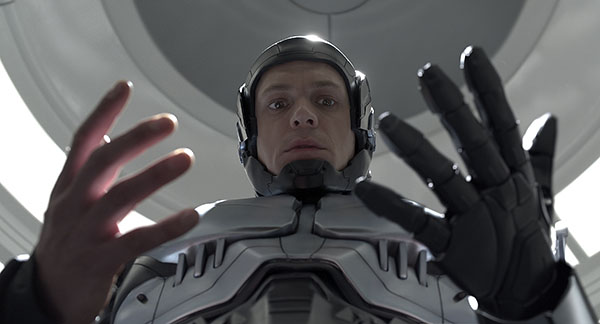Jose Padilha’s Robocop has taken a long, strange journey to the big screen. First announced almost five years ago, long before Padilha signed up to direct, the film encountered a tidal wave of opposition from fans, even with auteurs like Darren Aronofsky attached.
Since then its concept has undergone countless permutations and changes, all but eliminating the possibility of Paul Verhoeven-level violence by rating the film PG-13, and shuffling through more leading men than Hollywood’s best casting agent. But now that it’s completed – Robocop is assembled and online – how good is the end result?
You might also like: Michael Keaton compliments Joel Kinnaman on Robocop, from one costumed hero to another
According to Michael Phillips of the Chicago Tribune, it’s a sharp critique of contemporary politics, paired with recognizable action sequences:
“RoboCop becomes a pawn in the corporate game, as he was in the original film, but here the machinations and talk of focus groups and marketing strategies is more pronounced and pretty sharp. Most audiences will be content with the gamer-friendly set pieces, in which a fatality count snuggles itself into the upper-right corner of the screen.”
The Wrap’s Alonso Duralde, on the other hand, says that it avoids being too derivative of its iconic predecessor, but doesn’t quite develop enough personality to stand on its own two feet:
“At nearly a full two hours, however, this new “RoboCop” tests the patience and never really justifies its own existence… “RoboCop” avoids being a bad remake by giving the original wide berth, but all we’re left with this time around is a cop who becomes a robot without being particularly interesting in either incarnation.”
You might also like: Valentine’s Day: 5 movies guaranteed to depress any date
Over at The Verge, Todd Gilchrist suggests that its sociopolitical seriousness underscores the plausibility of someone actually conceiving a law-enforcing cyborg in real life, but those virtues play like consolation prizes for folks disappointed there are so few nods to the original:
“That general self-seriousness may simply be a result of the film’s sobering look at what might happen if this sort of experiment were to actually occur, which is admittedly a sort of way-home consolation for never hearing anyone utter the phrase “bitches, leave” or watching a man take a bath in toxic waste.”
The Wall Street Journal’s Joe Morgenstern, meanwhile, derides its rushed and superficial look at the ideas it presents, with Robocop eventually serving as a metaphor for the audience’s reaction to the movie:
“The original “RoboCop” became a classic because of the clarity, and sly humor, with which it dramatized a potent idea. This remake, reflecting its era all too accurately, bounces from one hyperlinked notion to the next—and one videogamelike simulation to the next—while Alex, or what’s left of him, undergoes acute information overload, thanks to networks of security cameras and criminal databases that he’s been plugged into.”
You might also like: Samuel L. Jackson’s big scoop: not all black people look the same
And finally, Topless Robot’s Luke Y. Thompson asserts that the film prevails over its critics simply by virtue of not being as terrible and unwatchable as everyone assumed:
“The new RoboCop is, you will be highly unsurprised to know, not operating on the same masterful level as its source material. But unlike many, MANY other things associated with the RoboCop brand over the years, it also does not suck. And that in itself is kind of a win.”
Watch Sky News for all of the latest updates about movies and music, only on FilmOn:
Follow TV Mix on Twitter: @tvmixusa
Contact TV Mix: editors@tvmix.com
SOURCE: TVMix.com

